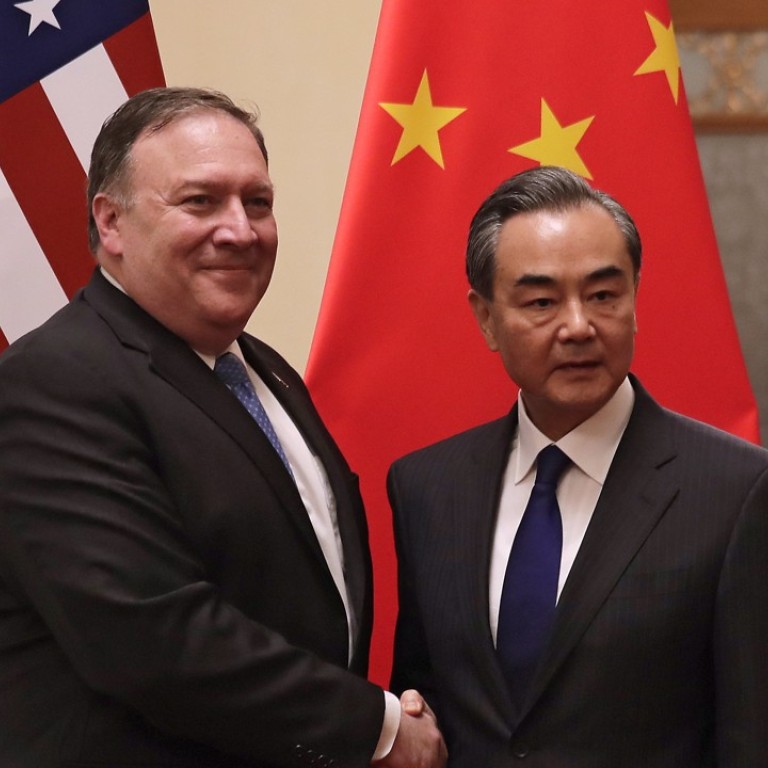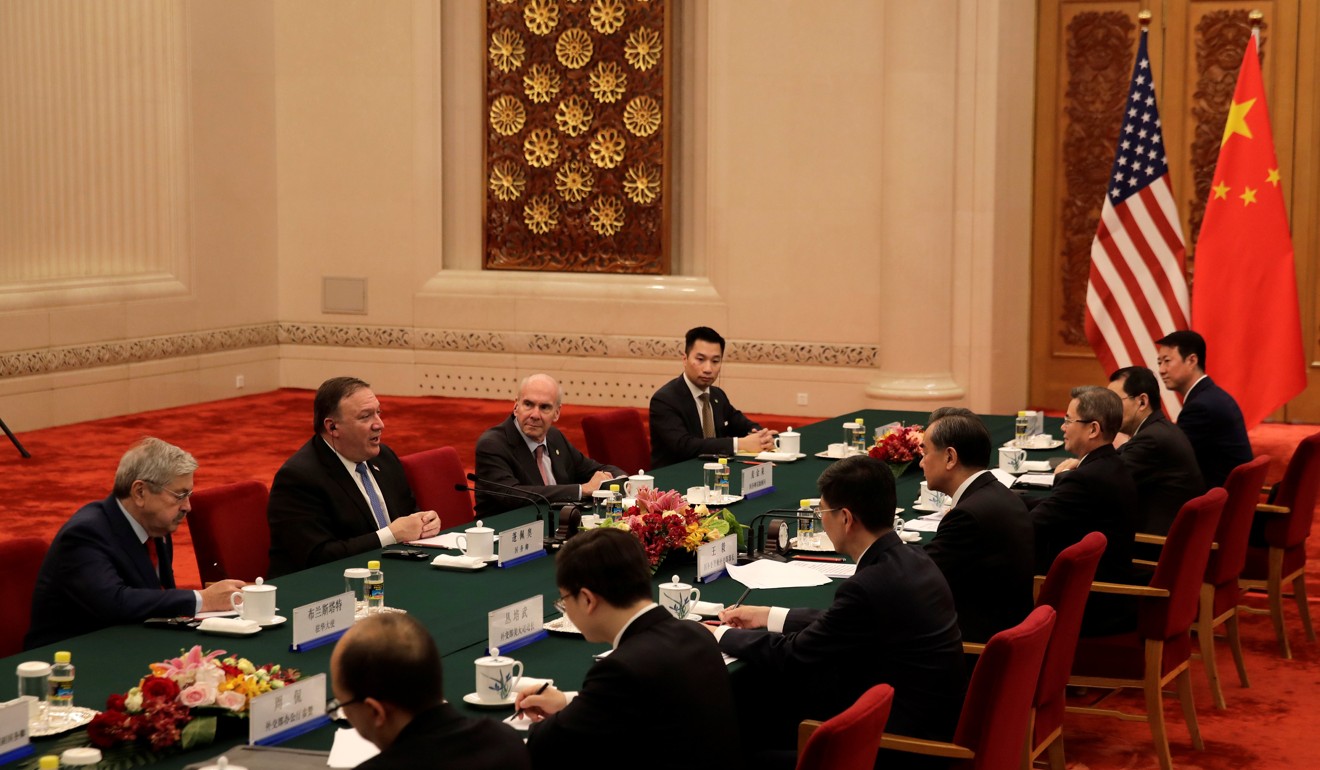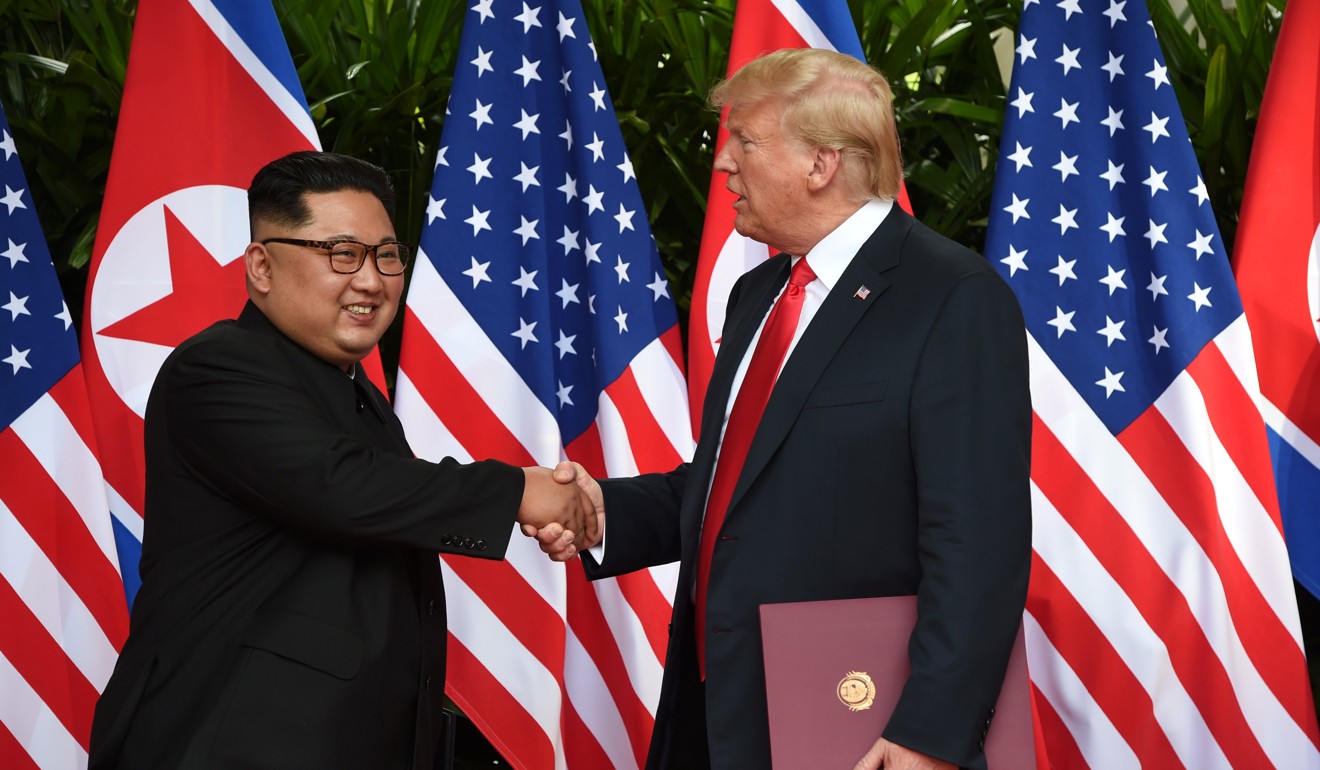
No nukes, no sanctions for North Korea, US Secretary of State Mike Pompeo tells China
Pyongyang must fully dismantle its nuclear programme before it can expect an end to the tough international penalties that many say brought it to the table this week in Singapore
The US’ top diplomat stressed on Thursday that North Korea would not gain any sanctions relief until the country had completely abandoned its nuclear weapons, pushing back against suggestions from China that tough United Nations-led penalties would soon be eased.
US Secretary of State Mike Pompeo underlined the position on sanctions and nuclear weapons in talks in Beijing with Chinese Foreign Minister Wang Yi, after meeting his South Korean and Japanese counterparts in Seoul earlier in the day.
Pompeo said China reaffirmed its commitment to honouring the “UN Security Council resolutions and those mechanisms for relief contained in them”.
“And we agreed that at [the] appropriate time, those would be considered. But we have made it very clear, that the sanctions and the economic relief that North Korea will receive will only happen after the full denuclearisation, the complete denuclearisation in North Korea,” he said.
Asked whether China supported the American approach on sanctions, Wang sidestepped the question, stressing only that Beijing and Washington needed to consider Pyongyang’s security concerns.
“We think we should address North Korea’s security interest concerns, which is to establish a peace mechanism for the Korean peninsula,” Wang said.
“I think that China and the US, as well as North Korea and other parties would agree that our ultimate goal is the same,” he said, adding that China was willing to continue to play a constructive role in the coming negotiations towards denuclearisation.
Pompeo also said he appreciated China’s help in bringing about the landmark summit between US President Donald Trump and North Korean leader Kim Jong-un on Tuesday.
The meeting was the first between a North Korean leader and a sitting US president and ended with a vaguely worded joint pledge to work towards “complete denuclearisation” of the peninsula.
“We appreciate all the work China did to put us in the place where the summit could happen,” Pompeo said. “We now believe that we have a path forward that can truly create peace on the peninsula.”

While China, Pyongyang’s main diplomatic and economic backer, was not directly involved in the Singapore meeting, Trump and Kim praised Beijing for its role in securing the summit and promoting peace talks.
Before his formal talks with Pompeo, Wang said the summit was “of historical importance”.
“The meeting has brought the nuclear issue of the Korean peninsula into the right track of dialogue and peaceful settlement, which is in line with the common interests of all parties, including the US and North Korea,” he said.
Wang pledged to continue to work with the US to push for a political settlement on North Korea.
During his meeting with Chinese President Xi Jinping late on Thursday, Pompeo stressed the personal ties between Xi and Trump and expressed hopes to push forward the goal to denuclearise the Korean peninsula “in the months ahead”.
“[Trump] truly values the relationship personally between the two of you and the relationship between our two countries,” Pompeo told the Chinese president.
Xi said he had maintained a friendly working relationship and “intimate personal friendship” with Trump. “I am very interested in exchanging information with [you] regarding the US-North Korea summit and views on Sino-US relations,” Xi said.
Pompeo also met Chinese Politburo member Yang Jiechi.

The Singapore summit’s joint statement has been criticised for failing to mention how “irreversible and verifiable” dismantling of North Korea’s nuclear and missile arsenal would be achieved.
Pompeo said in Seoul that North Korea should take major nuclear disarmament steps within the next two years before the end of Trump’s first term in January 2021.
Just hours after the Trump-Kim summit, the Chinese foreign ministry said international sanctions, which were widely seen as playing a big role in Pyongyang’s sudden embrace of diplomacy in recent months, could be eased to encourage North Korea to take further steps towards denuclearisation.
“The Chinese side believes that … the actions taken by the UN Security Council should support the current diplomatic dialogues and efforts in progressing towards denuclearisation of the Korean peninsula,” ministry spokesman Geng Shuang said on Tuesday.
Pompeo’s visit, his first to China since replacing Rex Tillerson as top US diplomat in April, comes amid heightened tensions between Beijing and Washington over trade and China’s claims to much of the South China Sea.
The White House is scheduled to announce on Friday whether it will slap tariffs of up to 25 per cent on a list of Chinese exports.
Pompeo said the trade deficit between the two countries was “still too high” and it was important for Trump to rectify the situation to achieve a more balanced, reciprocal and fair trade relationship.
Wang responded by saying that China hoped the US would not take “unilateral” and “unconstructive” action that would create new obstacles for the next round of trade negotiations. Wang also urged the US to stop all official and military exchanges with Taiwan.
Pompei also said he expressed US concerns over China’s military outposts in the South China Sea, facilities that he said threatened the sovereignty of other nations and undermined regional stability. He said he gained confirmation from his meeting with Wang that China would not “resort to threats, coercion and intimidation” to other claimants in the disputes.
Additional reporting by Bloomberg and Reuters

